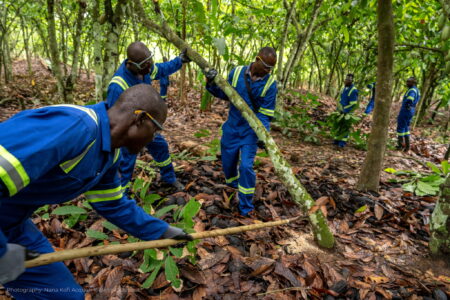Nestlé decision to cease Fairtrade cocoa sourcing sparks major concern from Ivory Coast farmers

Fairtrade cocoa producers in Ivory Coast have expressed key concerns over a Nestlé UK and Ireland decision to switch from buying cocoa and sugar on Fairtrade terms, as the multinational company moves to a new deal with Rainforest Alliance. Neill Barston reports.
In an open letter to the Swiss-headquartered business, the Ivorian Fairtrade Network (RICE), said the decision represented a ‘devastating blow’ to its group of 16,000 small-scale farmers who had operated as part of the present agreement, which formed a supply chain for KitKat and other major products over the past decade.
However, Nestlé stated it intends to continue supporting farming communities, and had factored mitigation plans into its decision – which it says was necessary as part of its drive to ensure 100% sustainably sourced cocoa by 2025.
Responding to the company’s latest decision, the Ivorian network highlighted a study from Fairtrade International that showed 58% of cocoa producers in Côte d’Ivoire live below the poverty line. They claimed the research demonstrated that collective efforts to support farmers are now needed more than ever. In addition, it noted that the present Fairtrade agreement with Nestlé has enabled access to education and healthcare for children, electricity, as well as wider improved living standards for remote communities.
The letter read: “Fairtrade is essential for us because it allows us to participate in the development of our communities independently. A non-Fairtrade trade relationship means regression and continued poverty. Indeed, only Fairtrade provides a minimum price and a fixed premium, non-negotiable, which is paid 100% to producers, to decide for ourselves how this premium is used for the improvement of our living conditions and the development of our communities.
“Nestlé is one of the leading buyers of Fairtrade certified cocoa through its KitKat brand and we are grateful for all this decade of partnership where we have contributed to its success. Right now, we are experiencing one of the greatest health and economic tragedies of our lives. Besides the new global pandemic of COVID 19, producers remain deeply affected by long-term poverty, lack of services, low and unpredictable incomes and climate change. We have seen how the Fairtrade minimum price, premium and safety net have benefited producers during this health crisis. These revenues have enabled us to act quickly against Covid-19 to protect our health, support our communities and deal with a food disaster in some cases.”
Explaining its decision, Nestlé said that it already had a longstanding partnership with Rainforest Alliance, and that it will continue to work together to build farmer resiliency, tackle key social and environmental issues such as child labour, and empower farmers with the knowledge and skills to negotiate for themselves in the global marketplace.
Simon Billington, Global Technical Manager for Nestlé Confectionery, stated that the move was critical to its sustainable cocoa programme, and as has been reported previously by Confectionery Production, an issue that remains at the core of leading manufacturers production goals.
“Our expanded partnership with the Rainforest Alliance underlines our commitment to sustainable cocoa sourcing throughout our global supply chain. We are aware that the move will have an impact on some farmers, and we are working hard to mitigate this. Nestlé will be maintaining the same level of cocoa spend for the 2020-21 season. We will be investing in a series of initiatives to support farmers and our cocoa growing communities over the next two years, including £1 million to develop an industry-first living income pilot and a further £500,000 on community projects.
“We want to continue working with our Fairtrade farmers and we will pay for them to get to the level required by the UTZ standard, which since 2018 has been part of the Rainforest Alliance
certification programme. If farmers are not able to do this in time for the next crop, we will also provide them with financial support for the coming year.
“Our successful partnership with Fairtrade is ending as we harmonise our certification for sustainable sourcing internationally. Over the last 10 years, Fairtrade and KitKat, together with millions of KitKat lovers in the UK, have supported cocoa farmers in the Cote d’Ivoire. We are grateful to the Fairtrade organisation and proud of the work that KitKat has supported with them.
“The Rainforest Alliance has significant experience working with cocoa farmers in understanding and implementing robust sustainability criteria that drives positive change, and we look forward to deepening our collaboration in the coming years.”
Alex Morgan, Chief Markets Officer, Rainforest Alliance said that the organisation was delighted that Nestlé is strengthening its position in the cocoa sector and unifying its responsible cocoa sourcing commitment across all of its portfolios, noting that the move came as the Alliance has just released a new seal and due to publish the new, improved Sustainable Agriculture Standard this month.
“Our certification programmes continue to connect companies, consumers, farmers and businesses committed to protecting the health of ecosystems, workers, and communities by using social and market forces to protect nature and improve the lives of food producers.”
As the business noted, it has invested CHF220 million (£180 million) into the Nestlé Cocoa Plan, which currently delivers 200,000 tonnes of certified sustainable cocoa annually. Through this scheme, the company has provided millions of more disease-resistant trees to cocoa communities, worked to reduce child labour through strengthening education provision and infrastructure, and has trained 114,000 farmers on sustainable farming best practice since 2018.
In addition, Nestlé UK and Ireland has sourced 100% certified, sustainable cocoa for its entire chocolate and biscuit portfolio since 2015, and this latest step will ensure consistency and security across the business’s global supply chain.



